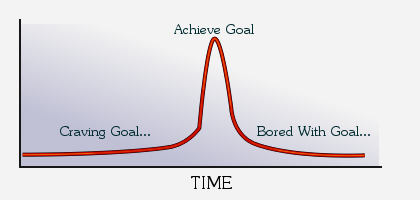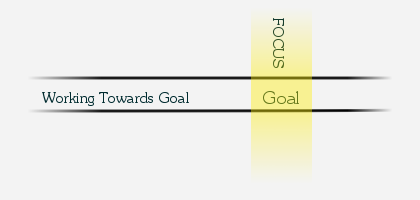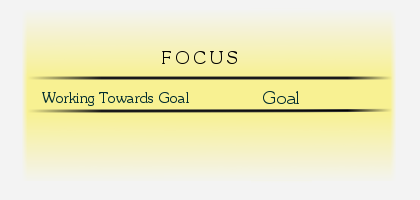The Buddha once claimed that desire creates suffering. On the surface this seems to make sense. You feel pain when you don’t get what you want. The solution, in Buddhism, is to cease desiring things and therefore your suffering will end. Somehow, that doesn’t feel right.
Sure, desire may create pain, but doesn’t it also provide meaning to life? In trying to remove the pain, don’t you also erase the joy, leaving you with a dull, gray existence. In this article I’d like to explore a third alternative, and how you can still experience joy without clinging to things.
Why Be Without Desire?
Before I go off into the high mountaintops of philosophical inquiry, let’s look at the practical matters. What does being without desire for things mean and why might it seem like a good idea?
For this example, let’s say you crave to be rich. I’m using wealth as an example but it could be anything, a healthy body, great relationships, academic or career success. Your craving to be rich leads to a couple side-effects:
- Until you become rich, you are dissatisfied. Like a man starving for food, you will feel hungry until your desire is satiated.
- You might never become rich. This may seem pessimistic, but you can’t entirely reject the possibility that the wealth you seek may never come. You are forever hungry.
- Even if you do achieve great sums of money, the feeling of fullness won’t last. Either you will find a new goal to crave, or you will become bored with your accomplishment.
Here’s a simple diagram showing your level of satisfaction with your current situation:

Even in the best circumstances, feeling full only lasts a moment.
Enjoyable Craving
The common counter-argument to this is that craving can be enjoyable. Feeling desire strongly can be a good feeling. So it isn’t fair to say that the entire build-up to a goal is painful.
I disagree. Pure craving is pain. Few people starving for food would describe the feeling as enjoyable. Loneliness is rarely referred to as being fun. Feeling poor, restricted or lacking are all forms of pain. Hope that tomorrow might be a bit better is only a small relief for the pain of craving. The Buddha is right, desire is suffering.
Should You Just Give Up?
With such a depressing outlook on the human condition, does this mean I recommend giving up your goals, selling your clothes and living in a hut smoking whatever pleasure inducing drugs you can manage to afford? Of course not.
There’s a third alternative. The decision isn’t between craving and emptiness. The third option is what I’m going to call a process focus. When you have a process focus, from an objective standpoint you don’t appear much different, you still set goals, have challenges and learn from failures. The difference is that craving no longer creates the pain it once did and you are free to live happier without wanting more stuff.
A Focus on Process
The problem with craving is that it is incomplete. It places the entire emphasis on only one moment, the goal. In your desire to be rich, this means that the entire emphasis is placed on the moment you reach a particular income. Everything before is merely a lead-up to this moment, and everything after is simply a consequence of it.

The alternative is to emphasize the entire process. This means that the moment of achievement is no more or less important than the first step or two months in.

“Life is a journey, not a destination.” It’s a nice platitude, but I don’t think it captures the real impact of what I’m suggesting. Small snippets of wisdom like this feel nice, but rarely communicate anything important. “Be yourself,” is another piece of frequently-cited wisdom that has become essentially meaningless.
What a Process Focus Means
A process focus means that successes and failures are equal. This has a nice ring to it, but it’s a system few people follow. How often can you say that you feel just as good with a win as you do with a loss? Instead, most people operate from craving, where success means satisfaction and failures are pain.
A process focus treats any pursuit as you would a game. In a game, the act of playing is the real motivation, not the win. After a heated chess match, you are generally no better off now that you’ve won. The only reason to play was the process of playing.
When you approach an area of life from a process focus, you see the entire path, not the goal as the reason to start. Run a business because you love running a business, not just because of the status, wealth or service it might bring. Interest in the process is more important than the result of a goal.
Examples of a Process Focus
Now I’d like to climb down the philosophical mountain for a bit and deal with the day-to-day. What does a process focus look like? Here are a few examples, in them you can easily imagine the opposite of operating from desire:
John decides to start dating. Instead of making it his goal to get a girlfriend, sleep with a bunch of women or become a modern-day Casanova, he becomes interested in other people and how dating works. Rejections and failures don’t bother him, because he is driven by an interest in other people and the process, not curing loneliness, lust or validating himself.
Julie begins school. She makes it her goal to become a doctor, but doesn’t focus on it. Instead she focuses on the classes, becoming curious about the material and how she can apply it to her interests. She even writes down goals for her term marks and GPA, but these are just constraints to make the process more fun and challenging for her, whether she achieves them or not doesn’t diminish her interest in what is happening right now.
Patrick is overweight. He sets a goal to lose twenty pounds, but doesn’t obsess over it. He starts by trying out different forms of exercise, eventually settling on running as something he enjoys. He tries to beat his previous records and makes a game out of putting on his shorts and jogging out each morning. He meets his weight-loss goal in record time, but sees it as only a minor bonus to a process he loves.
Hopefully these can give a picture of what a process orientation looks like from the inside-out. These are people who effortlessly achieve their goals. Not because they never challenge themselves, but simply because they don’t crave. They don’t want things, but are still happy because they engage themselves in the process.
Tomorrow I’ll post a follow-up article on how you can start building a process-orientation into your life.

 I'm a Wall Street Journal bestselling author, podcast host, computer programmer and an avid reader. Since 2006, I've published weekly essays on this website to help people like you learn and think better. My work has been featured in The New York Times, BBC, TEDx, Pocket, Business Insider and more. I don't promise I have all the answers, just a place to start.
I'm a Wall Street Journal bestselling author, podcast host, computer programmer and an avid reader. Since 2006, I've published weekly essays on this website to help people like you learn and think better. My work has been featured in The New York Times, BBC, TEDx, Pocket, Business Insider and more. I don't promise I have all the answers, just a place to start.